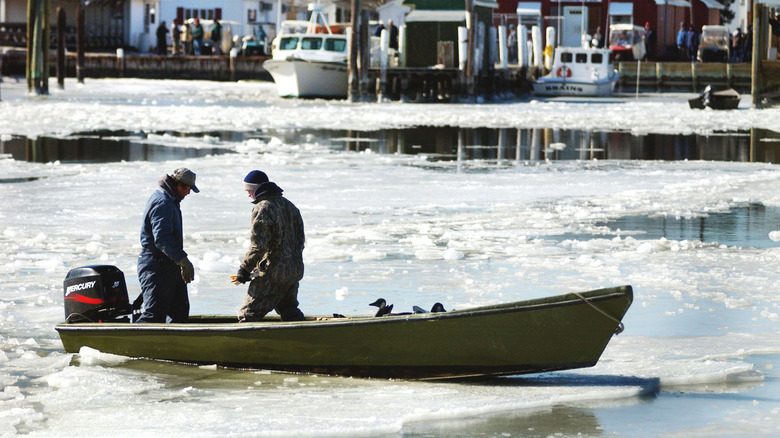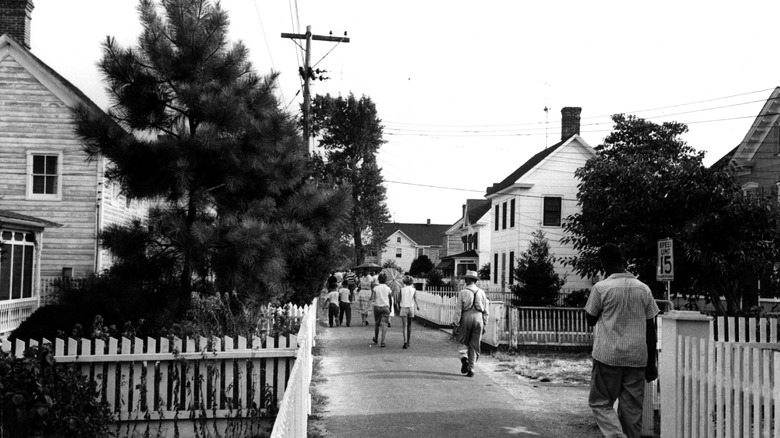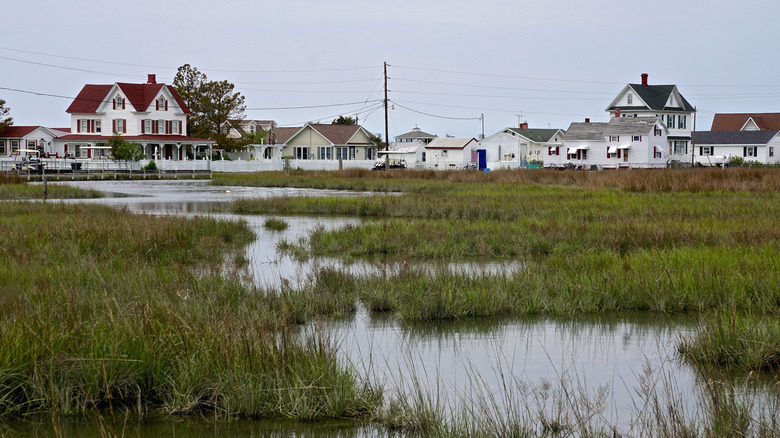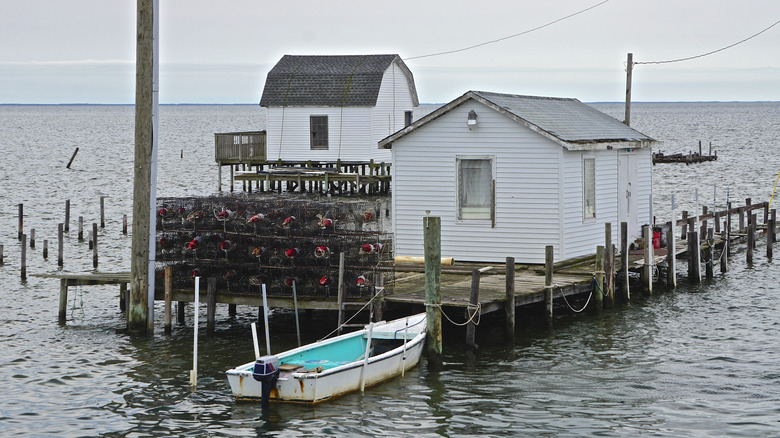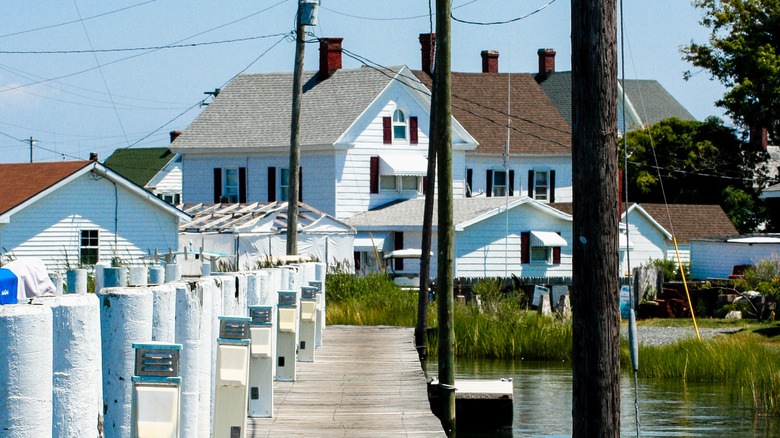The Origins Of The Unique Accent Heard Only On A Small Virginia Island
Picture this: a tiny Virginian island, just 13 miles out into the Atlantic Ocean, with under 750 acres of land, and only 80 acres of it inhabitable thanks to expansive wetlands and coastal vistas (via Chesapeake Living). Now imagine this quaint little island having very few cars, with most of its residents riding around on golf carts, scooters, bicycles, or just walking around. In fact, some of the only vehicles on the island are trucks making hauls for the island's booming fishing industry — which is about the only export it has going for it.
Even more curious, many of the residents are direct descendants of colonists from back in the 1770s. However, their bloodline isn't the only thing these islanders carry today. It's the whole "Waterman's" way of life. And we don't just mean spending days at sea, fishing and singing sea shanties of old. Everything about these "watermen" is authentic, down to the very way they speak.
A Dying Tongue
Many inhabitants of Tangier Island, just south of Maryland's Smith Island, have on a way of life that's over 250 years old (via Chesapeake Living). They fish, get around without cars, live off the land, but possibly the most interesting thing they've stuck to is a historic Cornish and/or Welsh accent. To many, this accent is very hard to understand, and descends directly from original settlers.
The island is just 12 miles off Virginia's Eastern Shore, and a short (hour-and-a-half) ferry or cruise ride from a few local ports. However, despite being nearly 100 miles south of DC, the grasp of modern living isn't far enough. There used to be just one boat ride to and from the island a day, but now, they're plentiful. High-speed internet arrived in the 2010s, and there are about 70 students on the island (between the ages of 5 and 17) who no longer possess the dying accent (via BBC). The onslaught of tourists broke the island's isolation, and its population, which has gone down by nearly 300, from 727 in 2010.
Talk the Talk
Although younger generations and newcomers to the island are making this accent scarce, many lifelong residents still speak with it (via BBC). In fact, the island is one of the very last places in the whole country where you can hear traces of colonial English. While modern-day Cornish/Welsh is a bit difficult to decipher for non-native speakers, this colonial dialect actually utilizes certain words to mean the opposite of what they mean in modern day English.
In some instances, telling someone jovially that they are late, is actually commenting on how early they are. Calling someone broke can actually mean rich, or saying a woman looks broke can actually mean she looks pretty. Some other interesting local slang includes saying "you have the meebs" to tell someone they stink, saying "Hawkins is here" if it's cold outside, and describing someone sleeping as being "in the sweet peas." If you're hungry, you better "mug up" or eat something, and if "you're selling cakes," that means you should check the fly of your jeans, because it's probably down.
A Disappearing Culture... and Island
According to local kids, there really is no reason to stay on the island (via Katherina Zotos on YouTube). The island, which thrives mainly on religion and fishing, has no malls, just one major road, and very little police presence. In fact, although the Virginia Marine Police and Maryland State Police help take care of the island as well, Tangier has its own little police force, of just one sworn in police officer (via County Office). People don't lock their doors here, and the only thing for kids to do is hang out and play basketball in the street.
It's no surprise that the population is shrinking, resulting in a dwindling of its colonial accent. Despite the island being a slice of heaven on Earth, with beautiful coastal views and miles upon miles of vast wilderness, many younger residents dream of greener pastures. And sadly, the pasture itself is shrinking.
Lost at Sea
According to a study by the US Army Corps of Engineers, 75 percent of the island has disappeared since the 1850s, and some scientists believe residents will have to evacuate as early as 2037 if sea levels keep rising (via BBC). In fact, part of Tangier's past has already eroded away, with a small sliver of wetland known as the "Uppards" floating just parallel to it. According to an island resident, Cameron Evans, in an interview with BBC, the uppards "used to be a small series of communities where people lived until the 1930s."
The northern bit of land used to be connected to the main island, raising houses and a cemetery from the sea, but this shell of what once was may foreshadow what's to come for the rest. The only thing that would save the island from this erosive end would be a $30 million investment to build a seawall — which they just don't have.
Tourism...Their saving grace, and downfall
A trip to Tangier Island feels like a trip to the 1700s, or at least the 1950s. There are only a few restaurants and Bed & Breakfasts in town, and one grocery store — none of which serve alcohol (via BBC). It has one road, limited mobile phone service and according to local kids, not much to do. And while this may seem like a nightmare for excitement-seeking youngin's, for those of us who just want to get away, it's paradise.
Although the island's recent tourism boom has been blamed for the demise of quaint living and an even quainter accent, it has helped the local economy. According to Tangier Island's online Travel Guide, the island's limited lodging fills up quickly (via Tangier Island). Visitors come to enjoy peace and quiet, water sport activities like fishing and kayaking, and other outdoor activities like birdwatching. While generations upon generations of residents have lived here fishing the waters, with bloodlines and nearly 300 expressions found only on this island dating back to the 1700s, tourism seems to be its new way of life. And maybe all those funds coming in can help save it (a sea wall perhaps?).
This isn't likely, however. With all the tourism and fishing funds in the island, $30 million would still be a feat. Recent news has questioned the U.S. government on saving the island, but sadly, unless something is done, tourism to this island haven will not last much longer, as there will be no island to travel to (via The New York Times Magazine).
